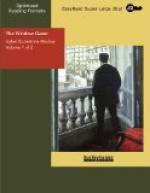“And now, Benis, that we are alone—” began Aunt Caroline. . . .
We may safely leave out several pages here. If you realize Aunt Caroline at all, you will see that at least so much self-expression is necessary before anyone else can expect a chance. Time enough to pick up the thread again when the inevitable has happened and her exhausted vocabulary is replaced by tears.
“Not that I care at all for my own feelings,” wept Aunt Caroline. “There are others to think of. What will Bainbridge say?”
Her nephew roused himself. From long experience he knew that the worst was over.
“Bainbridge, my dear Aunt,” he said, “will say exactly what you tell it to say. It was because we realized this that we decided to leave the whole matter in your hands—all the announcing and things. But of course,” with resignation, “if we have taken too much for granted; if you are not equal to it, we had better not come back to Bainbridge at all.”
“Oh,” cried Aunt Caroline with fresh tears. “My poor boy! The very idea! To think that I should live to hear you say it! How gladly I would have saved you from this had I known in time.”
“I am sure you would, Aunt. But the gladness would have been all yours. I did not want to be saved, you see, and people who are saved against their will are so frightfully ungrateful. Wouldn’t you like a dry hanky? Just wait till you’ve had a couple of dozen sandwiches. You’ll feel quite differently. Think what a relief it will be to have me off your mind. You can relax now, and rest. You’ve been overworking for years. Consider how peaceful it will be not to have to ask any more silly girls to visit. You know you hated it, really, and only did it for my sake.”
“I did everything for your sake,” moaned Aunt Caroline brokenly. “And they were silly. But I hoped you would not notice it. And you will never know what I went through trying to get them down for breakfast at nine.”
“I can imagine it,” with ready sympathy. “They always yawned. And there must have been many darker secrets which I never guessed. You kept them from me. Do you remember that hole in Ada’s stocking?”
“Yes, but I—”
“Never mind. The fib wasn’t nearly as big as the hole. But how could you expect me to help noticing the general lightness and frivolity of your visitors, shown up so plainly against the background of your own character?”
“Y-es. I didn’t think of that”
“Perhaps I should never have married if I had not got away—from the comparison, I mean.”
“There was a danger, I suppose. But,” with renewed grief, “Oh, Benis, such a wedding! No cards, no cake—and in pyjamas—oh!”
“Come now, Aunt, don’t give way! And do you feel that it is quite right to criticise the clergy? I always fancy that it is the first step toward free-thinking. And you couldn’t see much of them, you know, only the legs. Besides, consider what a wedding with cards and cake would have meant in Bainbridge at this time. No second maid, no proper cook! We should have appeared at a disadvantage in the eyes of the whole town. As it is, we can take our time, engage competent help, select a favorable date and give a reception which will be the very last word in elegance.”




